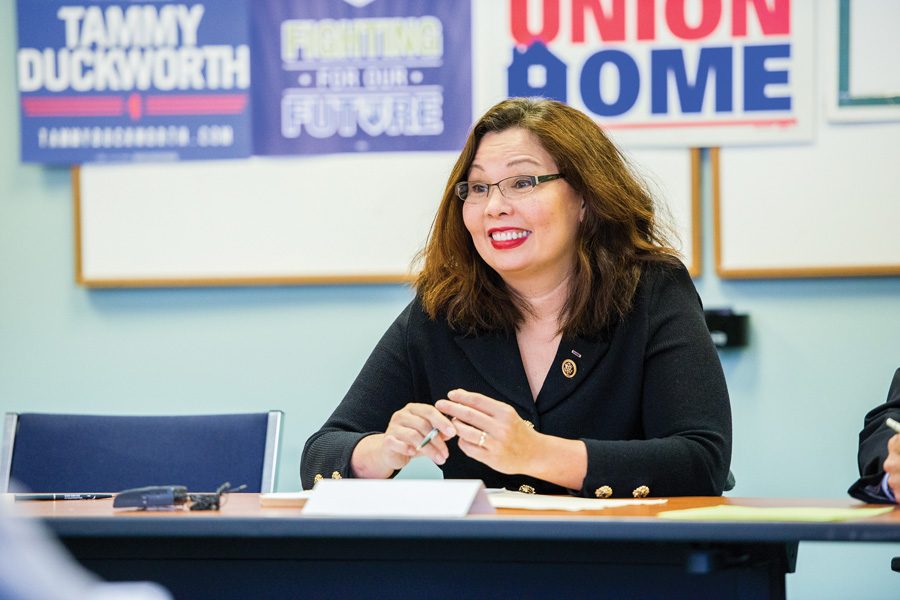Here’s how Illinois elected officials are pushing for coronavirus legislation
Daily file photo by Sam Schumacher
Though she voted in favor of the coronavirus relief package, U.S. Sen. Tammy Duckworth (D-Ill.) criticized the bill, calling it “far from perfect.”
May 3, 2020
Amid the COVID-19 pandemic, Evanston’s elected officials at the federal and local levels have been at the forefront of pushing for legislation to aid their constituents.
U.S. Rep. Jan Schakowsky (D-Evanston) announced Thursday that she and U.S. Sen. Elizabeth Warren (D-Mass.) have developed a plan to combat mask, medicine and PPE shortages. The legislation would establish a new federal agency and address supply shortages in states most affected by COVID-19.
The COVID-19 Emergency Manufacturing Act also serves as a counter to Trump’s use of the Defense Production Act. The latter allows the president to order domestic manufacturers to make coronavirus supplies, expanding their production. Schakowsky said in a statement that Trump has failed to scale up the production of PPE, prescription drugs and medical supplies to the necessary level at this point in the crisis.
“Our COVID-19 Emergency Manufacturing Act will ensure we’re not held hostage by the private sector or the ill-prepared Trump Administration,” Schakowsky said. “We must include this bill in the next relief package so that the United States can rapidly develop these critical supplies and be ready to ramp up our pharmaceutical manufacturing capacity when a vaccine is discovered.”
U.S. Sen. Dick Durbin (D-Ill.) announced a new bill Thursday that would establish a task force to combat racial and ethnic disparities in COVID-19 testing, healthcare and deaths. The statement read that the pandemic has exposed the inequities of the U.S. healthcare system and how it negatively affects communities of color, which this task force hopes to rectify by confronting these disparities “head-on.”
[Read here to learn more about racial disparities in Evanston COVID-19 cases.]
The interagency task force would consist of policy experts, community leaders and government officials to make recommendations regarding the distribution and production of essential supplies like testing kits and PPE to marginalized communities. This would provide a more equitable government response, the statement read, to communities of color already facing disparities in COVID-19 infection, hospitalization and death rates.
“Sadly, I was not surprised when I heard about the drastic racial and ethnic disparities in COVID-19 cases and deaths,” Durbin said in the statement. “We have known that communities of color have dealt with systemic health disparities for generations, but the federal government hasn’t done enough to understand the issue and present solutions.”
In March, the Senate passed a $2 trillion federal coronavirus relief bill, of which $4.9 billion went directly to Illinois’ state and local governments. The legislation was passed unanimously, but Illinois’ senators had mixed opinions on the specifics of the bill.
Though she voted in favor of the relief package, U.S. Sen. Tammy Duckworth (D-Ill.) criticized the bill, calling it “far from perfect.” Duckworth noted that lawmakers compromised over provisions, such as one that limits women’s access to healthcare. Another, she said, punishes healthcare workers who offer services to people with disabilities, the elderly and survivors of rape and abuse.
Duckworth also noted that the compromise leaves many low-income and disabled Americans behind. She said the next round of negotiations should include more provisions that address resources for anti-hunger programs, protect renters and homeowners from evictions and provide sick leave for workers.
“My vote does not diminish just how bitterly disappointed I am… but it also does not diminish my will to continue fighting for Americans who have not traditionally had a voice in Congress,” Duckworth said in a statement.
Email: [email protected]
Twitter: @isabellesarraf
Related Stories:
– City Council passes resolutions, ordinance to support residents during COVID-19
– The myth of the ‘great equalizer’: Preliminary data show black Evanston residents contract virus at higher rates
– Stimulus bill to fund Evanston school districts, child care programs


